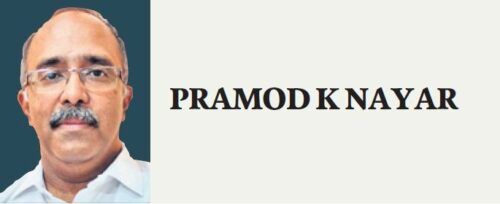Opinion: At home, nowhere
When the home is under siege, the sense of being ‘at home’ is irreparably lost, often forever.

By Pramod K Nayar
In his iconic opening lines to a famous poem, AK Ramanujan writes about a house:
Also Read
Sometimes I think that nothing
that ever comes into this house
goes out.
Ramanujan defines the qualities — inclusive, diverse, compassionate, multi-layered — of this ‘great house’, and in the process defines India itself. But how does a poet write of homes that exist in myth and memory alone, everything else being destroyed, its inhabitants scattered and possessions left behind?
Homes left behind
Robin Ngangom in ‘Poem for Joseph’ speaks of homes that
ethnic cleansers had palmed
your newly-built home off on a people
well on their trail back to pure blood
Consequently, the residents fled:
leaving behind
objects of desire
… collected over twenty-five years
Such objects have a way of travelling with the displaced. We turn to a poet of the refugee/displaced populations, the Kurdish Choman Hardi, for an understanding of the situation in ‘My Mother’s Kitchen’. Her mother thrives on displacement:
At 69 she is excited about starting from a scratch.
It is her ninth time.
Unregretful,
She never talks about her lost furniture
when she kept leaving her homes behind.
If Ngangom’s speaker observes that the displaced only mourns of the loss of family photographs, Hardi’s mother only regrets the loss of the
vine in the front garden
which spread over the trellis on the porch.
Hardi’s own regret is that while she may inherit the mother’s crockery (as the old woman assures her), she ‘will never inherit my mother’s trees’. Elsewhere Hardi speaks of her father’s books that remain, are rearranged, and some abandoned:
Packed themselves into a luggage bag
Buried themselves in the back garden,
To be recovered many years later,
Crumpled, eaten by the damp.
The books, like her mother’s glasses, are material witnesses that can be made to tell their stories of displacement, the loss of home and the anguish of memories. But this telling requires an appropriate audience, as Hardi notes:
The rest chose more suitable homes
Where they wouldn’t be abandoned again.
They shone on other people’s shelves
Keeping their secrets to themselves.
The secrets would remain, until the sympathetic reader unravelled the mysteries of the books’ original owners, their trauma and their loss.
The Palestinian Mahmoud Darwish also inventories his home in ‘I Belong There’:
I have a mother, a house with many windows, brothers, friends, and a prison cell
Objects in the home constitute the identity of the residents: things in the home converge upon the life-narratives of their owners and users. For the residents, their life narratives include the narrative elaborations of the objects they desire, possess, show-off, use. Thus, when the objects are separated from their owners, thrown out or abandoned, it is not just that they lose their value: their owners lose a bit of themselves too.
Homes under siege
Choman Hardi can only imagine homes under siege, as in ‘Invasion’
we will hear
the sound of their …
In their death-bringing uniforms
they will march towards our homes
The only thing to do, for it is a lost battle, says Hardi, is to ‘keep your head down and stay indoors’. But would that make the residents feel at home? Mahmoud Darwish speaks of the cruelty of the invaders:
We saw the faces of those who will throw
our children out of the window of this last space
As Nissim Ezekiel would say in ‘Background, Casually’, ‘how to feel at home, is the point’. When the home is under siege, the sense of being ‘at home’ is irreparably lost, often forever. In situations of siege, the poet’s vocation is under threat and so Darwish’s speaker ‘learned all the words needed for a trial by blood’. Darwish would say elsewhere
No land on earth bears me. Only my words bear me…
When the poem ends, he can only disaggregate the words left:
I have learned and dismantled all the words in order to draw from them a single word: Home.
Never At home
Displaced people cannot feel at home. They cannot settle down, nor are they allowed to. Kicked out from any home they settle into, the Kurds, writes Hardi in ‘Birds’:
turn to the illusion of travelling
between the warm and the cold climes
of their homeland
They ‘build no nests’ and endlessly
go from country to country
and still never realise their dreams of settling
Mahmoud Darwish anticipates Hardi when he writes of the lands his people are forced to flee to in ‘We Journey Towards a Home’:
We journey towards a home not of our flesh. Its chestnut trees are not of our bones.
Its rocks are not like goats in the mountain hymn
The land they are forced to occupy, ordered to make-do with, is foreign, just as they are foreign to it. They come to it like the pioneers in Canada, brilliantly captured by Margaret Atwood in ‘Disembarking at Quebec’:
The moving water will not show me
my reflection.
The rocks ignore.
I am a word in a foreign language.
In another poem Darwish speaks of the earth as ‘squeezing’ the displaced, implying how they are squeezed out from any place. This results in myths and memories of homes lost and homes not yet gained. Darwish writes:
Of our home we see only the unseen: our mystery.
Perhaps a ‘man’s destination is not his destiny’, as the poet Eliot says, because in the poetry of displacement, destinations turn out to be yet another stopping points on an interminable journey. They reside in temporary shelters and camps, the latter made famous by Primo Levi’s poem ‘The Survivor’ whose speaker has nightmares about his former fellow-inmates.
Camps, like the inns in Marianne Moore’s ‘Silence’, ‘are not residences’, even as they constitute the stuff of life-time nightmares and the never-ending anxiety of home. Elie Wiesel summarises his camp experiences where, in place of the hearth that marks the home, there are the ‘fires of hell’ (‘holocaust’):
Never shall I forget that smoke.
Never shall I forget the small faces of the children whose bodies I saw
transformed into smoke under a silent sky
From these camps, the displaced never reach the status and stability of home. As a result, there is the longing for stability, homelands first and then homes therein. The last word on the impossibility of home is surely Darwish’s:
Where should we go after the last frontiers?
Where should the birds fly after the last sky?

(The author is Professor of English and UNESCO Chair in Vulnerability Studies at the University of Hyderabad, and a Fellow of the Royal Historical Society)
Related News
-
India beats France 21-14 to win HPRC International Arena Polo title
-
India AI Impact Summit 2026 draws strong global response, 70 teams named finalists
-
From India to the World: AI Mahashivaratri by SUPER AI Academy Unites 500+ Participants to Create 5,700 Telugu Devotional Songs
-
India wedded to strategic autonomy: EAM Jaishankar amid US claims on Russian oil buys
-
Iran warns of ‘decisive’ response if subjected to military aggression
1 min ago -
US study finds direct link between air pollution and Alzheimer’s disease risk
9 mins ago -
Terror plot foiled in Arunachal’s Longding; NSCN-IM militant arrested, arms recovered
11 mins ago -
Tharoor breaks ranks, backs India’s AI summit as PM Modi charts global push
21 mins ago -
Surgical instrument found in woman’s abdomen 5 years after surgery in Kerala
33 mins ago -
Ranveer Singh threat case: Lawrence Bishnoi gang demands Rs 10 crore
41 mins ago -
Stock markets bounce back after falling in early trade
43 mins ago -
Yash unveils bold new avatar in Toxic: A Fairytale for Grown-Ups
54 mins ago




